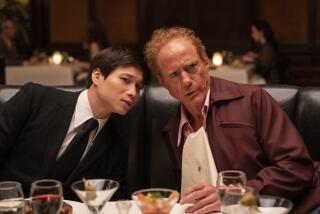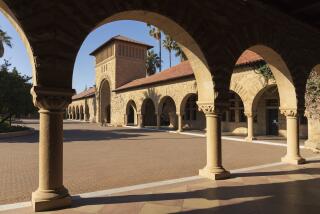A catalog of U.S. woes surrounding Vietnam
- Share via
LUBBOCK, Texas — Our fascination with America’s longest and most divisive war did not end with the fall of Saigon in 1975. At least 680 novels about the Vietnam War have been published by U.S. authors. Dozens of movies have been made. College courses on the war--and those using it as a point of departure--are in great demand.
At Yale University, Dan Duffy teaches a course on Vietnamese literature. At Boston University, Stephen Lyne, a retired State Department officer, teaches one on the foreign relations of the Vietnam era. At Colorado State University, John Pratt teaches the literature of the war.
Here in Lubbock, Texas Tech University has put together the largest private Vietnam archive in the country and has become one of the nation’s most important centers for scholarly research into the war. Leading educators and former military leaders from both the former North and South Vietnams recently gathered at the university to offer some personal insights into a conflict that redefined America’s role in the world.
During the conference, Elmo R. Zumwalt Jr., commander of U.S. naval forces in Vietnam from 1968-70, referred to the war as “long and erroneously fought.” But he added that defeat in Vietnam helped contribute to the West’s eventual victory in the Cold War by forcing the United States to devise other techniques for thwarting communism.
He recalled that in the initial stages of the U.S. involvement in Vietnam, some military planners wanted “to strike at the heart of the insurgency” with landings in Hanoi and Haiphong.
“They were overruled, but we could have taken those places with less than 5,000 American casualties,” he said. “As it was, we lost 58,000 dead. Clearly in the view of the military, that should not and need not have happened.”
Bui Tin, the North Vietnamese Army colonel who accepted South Vietnam’s surrender in April 1975, said he believes both U.S. hawks and doves during the war were motivated by honest convictions. But he said the American public still has one responsibility in Vietnam to fulfill.
“You can create the pressure of world public opinion so that the authoritarian regime in Hanoi is forced to reform,” said Tin, who now lives in Paris and is a critic of the government he served on the battlefield.
Tin’s old enemy, Nguyen Khanh, a former general who headed South Vietnam for a year, recalled that when he was overthrown and exiled to the United States in 1965 he left carrying a handful of Vietnamese earth. He now lives in California, home to more than half a million Vietnamese.
Reflecting on assimilation, he said: “From my generation, you’d get different answers, but my children’s generation think of themselves as 100% American, and my grandchildren are 110% American.”
The Archive of the Vietnam Conflict was set up almost single-handedly by James Reckner, a 56-year-old history professor and Vietnam veteran. The idea came to him eight years ago when he wanted to establish a graduate course on the war but learned that the Texas Tech library had little to support researchers.
With a small grant from the university library, he began making acquisitions and appealing for donations. Among the material now available at the archive are 16 boxes of papers from former CIA Director William E. Colby, 16,000 pages of CIA documents, State Department files on Indochina and documents from the Eisenhower administration on the initial decisions committing the United States to aid South Vietnam.
The archive got a bonanza in December when Douglas Pike, a specialist on the National Liberation Front (Viet Cong), moved to Texas Tech with a collection including 15,000 books, 500 videotapes, 3,000 slides and 15,000 monographs.
The educators at the Vietnam seminar generally agreed that for all the interest in the war, today’s generation is mystified by, and often ignorant of, the conflict’s key figures and details.
Pratt asks his students at the beginning of each class to identify Ngo Dinh Diem (the U.S.-backed South Vietnam leader who was assassinated in 1963), the Gulf of Tonkin incident (the alleged North Vietnamese attack in 1964 on a U.S. destroyer that was used to justify a dramatic expansion of U.S. forces in Vietnam) and the 1968 Tet offensive (North Vietnam’s attack against South Vietnam’s cities that helped turn U.S. public opinion against the war).
Over half his students leave these queries blank.
Texas Tech hopes its Vietnam center eventually will change that. Said Reckner: “One hundred years from now, people might visit the [Vietnam Memorial] Wall as a curiosity. But if they really want to understand what happened in Vietnam, they will have to visit the Archive of the Vietnam Conflict.”
More to Read
Sign up for our Book Club newsletter
Get the latest news, events and more from the Los Angeles Times Book Club, and help us get L.A. reading and talking.
You may occasionally receive promotional content from the Los Angeles Times.








